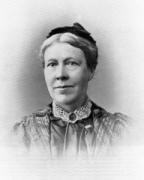|
|
||||||||||||||||||||||||
 |
Featured person
John Stewart
Recently added |
Isabella Tod (1836 - 1896): |
||||||||||||||||||||||

|
| Isabella Tod |
Isabella Maria Susan Tod was born in Edinburgh on 18 May 1836. Her father, James Banks Tod, was an Edinburgh merchant; her mother, Maria Isabella Waddell, was a native of County Monaghan.
Isabella was educated at home, apparently by her mother, who had a profound influence on her life. By the 1860s she was living in Belfast with her mother, who died in 1877. Tod was always proud of her Scottish blood and frequently alluded to the fact that one of her ancestors signed the copy of the Solemn League and Covenant at Holywood, Co. Down, in 1646.
For a period Tod earned her living by writing leaders for the Belfast newspaper the Northern Whig. She was a contributor to the Dublin University Magazine and The Banner of Ulster. She was the only woman called upon to give evidence to a select committee inquiry on the reform of the married women's property law in 1868 and served on the executive of the Married Women's Property Committee in London from 1873 to 1874.
Tod successfully campaigned for the repeal of the Contagious Diseases Acts of 1864, 1866 and 1869. Under the terms of this legislation, any woman suspected of being a prostitute could be arrested and forced to undergo medical examination for venereal disease. She opposed these acts as an infringement of women's civil liberties. A life-long advocate of temperance, in 1874 she and Margaret Byers formed the Belfast Women's Temperance Association.
She was a consistent advocate of access to secondary and tertiary education for girls. The Ladies' Collegiate School Belfast (1859), the Queen's Institute Dublin (1861), Alexandra College Dublin (1866), and the Belfast Ladies' Institute (1867) owe their existence to Tod's campaigns. In her publication On the Education of Girls of the Middle Classes (1874), she called for practical education along the lines provided by the Belfast Ladies' Institute, which she had helped establish in 1867, to enable middle class women to earn a living. She pressured government to include girls within the terms of the Intermediate Education act of 1878.
In 1871 Tod organised the first suffrage society in the country, the North of Ireland Women's Suffrage Committee, and her speeches were widely reported in the suffrage journals and daily newspapers in both Ireland and England. She shared platforms with, and was a friend of, many of the leading English suffragists. In February 1872 Tod embarked on the first Irish campaign to secure the vote for women, addressing meetings at Belfast, Carrickfergus, Coleraine and Londonderry. On 21 February she addressed a meeting in Dublin which resulted in the establishment of a suffrage committee which evolved into the Dublin Women's Suffrage Society.
In 1873 she formed the North of Ireland Women's Suffrage Society. Her campaign to ensure that women were granted the municipal franchise was rewarded for her efforts by the granting of this franchise to Belfast women in 1887, eleven years before women in other Irish towns were given the same privilege. She addressed meetings in London, Glasgow and Edinburgh, and visited London annually during the parliamentary session to lobby politicians. She was a Liberal in politics but capable of co-operating very effectively, if circumstances required it, with Conservative politicians.
Prime Minister Gladstone's conversion to Irish Home Rule split the Liberal Party, produced realignment in British politics, and sundered many old friendships. This too was Isabella Tod's experience; old friends and fellow campaigners became political opponents. She organised a Liberal Women's Unionist Association in Belfast and spoke on platforms in Devon, Cornwall, and London. She argued that: “Home Rule would destroy Ireland's economic base, not only would there be a withdrawal of capital... many skilled artisans would come over to England which would not tend to raise wages”. She worked tirelessly as a publicist and was the only woman member of the executive committee of the Ulster Women's Liberal Unionist Association in 1888.
The last few years of Tod's life were dogged by bad health. By this time, her work was much appreciated by many individuals in both England and Ireland. In 1884 she was presented with a testimonial of £1,000 contributed mainly by her “English fellow workers in various philanthropies”. In November 1886 she was presented with a full-length portrait as a token of appreciation for her work in Ireland. Another testimonial, some years later, consisted of an album, which contained 120 signatories, many fr om the front rank of the Unionist Party. She died at her home in Botanic Avenue, Belfast on 8 December 1896.
Isabella Tod is regarded as the most prominent feminist in nineteenth century Ireland.
| Born: | 18 May 1836 |
| Died: | 8 December 1896 |
| Kate Newmann |
| Acknowledgements: ONDB: Maria Luddy Herstory; Ulster-Scots CommunityNetwork UCC: Tómas O’Riordan |


Home | Our Policies | Plaques | Browse | Search | Sponsors | Links | Help | Contact
Privacy & Disclaimer | Cookie Policy | Site Map | Website Design By K-Point
© 2024 Ulster History Circle








